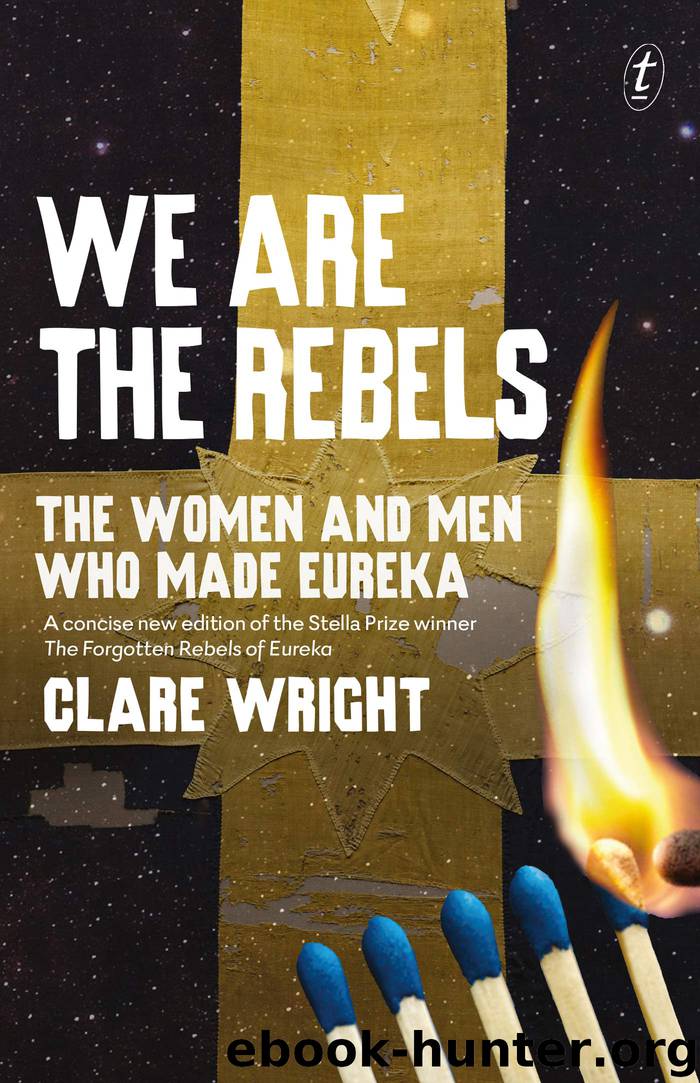We Are the Rebels by Clare Wright

Author:Clare Wright
Language: eng
Format: epub
Publisher: The Text Publishing Company
Published: 2015-07-05T16:00:00+00:00
LIQUID GOLD
The move to grant licences on the diggings caused an immediate onslaught of applications. No sooner was the law proclaimed than the licensing bench was besieged with applicants. Every individual who had the means, seemed desirous of setting up a public house as a certain method of making a fortune, recalled Magistrate John D’Ewes, who was on the bench. Over a hundred applications were received overnight.
At Eureka, licences were granted to the Turf Inn, run by William Tait, the Free Trade, run by Alfred Lester, the London, run by Hassell Benden and Robert Monkton, the Star, run by William McRae and the Victoria Hotel, run by Germans Brandt and Hirschler.
Other diggings hotels included the Alhambra on Esmond Street, and the Arcade on York Street, just up from Main Road. The Duchess of Kent Hotel, on Main Road, was licensed to Mrs Spanhake, the 25-year-old wife of a German miner. Raffaello Carboni lodged here for some period in 1854. There was the Eagle on Scotchman’s Hill and the Prince Albert on Bakery Hill. Carboni described the publican at the Prince Albert as: as wealthy and proud as a merchant-prince of the City of London. Hotels were licensed to Englishmen, Germans, Jews, the Irish and Scots. New publicans vied for the custom that had previously been monopolised by the town hotels, Baths, the Clarendon and the George.
Women like Mrs Spanhake seized the opportunity to enter into the liberalised market, joining the ranks of female publicans who had long been legends in the district. Mother Jamieson had run the hotel at Buninyong, eight miles from Ballarat, since 1845. John D’Ewes described Mrs Jamieson as:
an extraordinary specimen of a Scotch landlady, whose colonial independence of character (except when she took a liking) always verged upon insolence, and very often abuse; woe to be the mistaken individual who tried to oppose her when in these moods as he had little chance of either food or lodging at her hands.
D’Ewes felt fortunate to fall in her good graces, suggesting the power of such landladies to call the shots.
Catherine Bentley had now joined the ranks of women who were legally empowered to say who was in and who was out.
Download
This site does not store any files on its server. We only index and link to content provided by other sites. Please contact the content providers to delete copyright contents if any and email us, we'll remove relevant links or contents immediately.
| Foreign Language Study | History |
| Language Arts | Mathematics |
| Reference | School & Education |
| Science & Technology | Social Science |
| Study Aids |
Pale Blue Dot by Carl Sagan(5007)
Cracking the GRE Premium Edition with 6 Practice Tests, 2015 (Graduate School Test Preparation) by Princeton Review(4293)
Pocahontas by Joseph Bruchac(4259)
Unfiltered by Lily Collins(4004)
The Emotionary: A Dictionary of Words That Don't Exist for Feelings That Do by Eden Sher(3365)
The Daily Stoic by Holiday Ryan & Hanselman Stephen(3317)
The 48 laws of power by Robert Greene & Joost Elffers(3291)
Factfulness_Ten Reasons We're Wrong About the World_and Why Things Are Better Than You Think by Hans Rosling(3237)
The Innovators: How a Group of Hackers, Geniuses, and Geeks Created the Digital Revolution by Walter Isaacson(3206)
The President Has Been Shot!": The Assassination of John F. Kennedy by Swanson James L(3101)
Sapiens and Homo Deus by Yuval Noah Harari(3071)
Rogue Trader by Leeson Nick(3043)
Gettysburg by Iain C. Martin(2834)
The Rape Of Nanking by Iris Chang(2823)
Almost Adulting by Arden Rose(2709)
The Plant Paradox by Dr. Steven R. Gundry M.D(2620)
In the Woods by Tana French(2598)
500 Must-Know AP Microeconomics/Macroeconomics Questions(2572)
Make by Mike Westerfield(2321)
